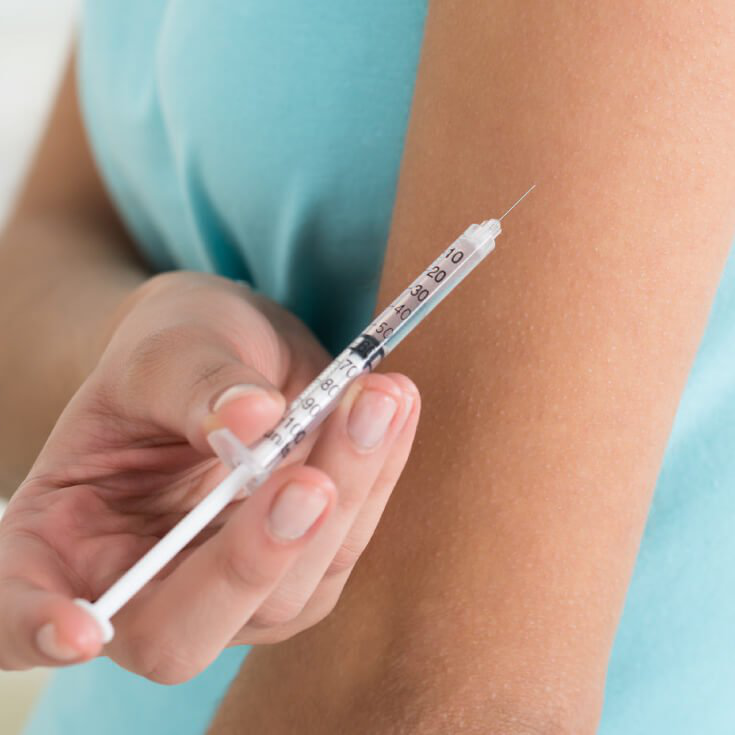


Vitamin B12 injections are given to treat a deficiency of vitamin B12. A deficiency of vitamin B12 can occur in some medical conditions such as cancer, infection, intestinal/stomach problems or poor nutrition and may cause nerve damage, anemia and stomach problems. As happens with all other medicines, you should have knowledge of the possible adverse effects of injections of vitamin B12 before you get them.

Injections of vitamin B12 are generally considered safe if they are given properly. However, patients may have many adverse effects from these injections, some of which are:
If any of the above mentioned adverse effects become troublesome or severe, tell your physician.
Serious Adverse Effects
Though rare, injections of vitamin B12 may cause serious adverse effects in various parts of body such as lungs, heart, nerves, skin and muscles.
Cardiovascular Side Effects
The below mentioned symptoms affecting lungs and heart may occur:
Musculoskeletal Side Effects
Neurological Side Effects
The below mentioned vitamin B12 injection side effects may occur in the neurological system:
Dermatological Side Effects
The following symptoms of the skin may occur:
Metabolic Side Effects
The below mentioned metabolic adverse effects may happen:
Other side effects of injections of vitamin B12 can also occur. In case you notice any unusual symptoms while taking these injections visit your physician immediately.
There exist numerous potential contraindications to vitamin B12 injections. Ensure to inform your physician in case you are lactating, pregnant or suffer from any of the below mentioned medical conditions before beginning B12 injections:
Leber’s Disease
Any person who has a history of Leber’s disease must not get injections of vitamin B12. Leber’s disease is a hereditary optic neuropathy that results in slow painless loss of vision. Injections of B12 may worsen this disease.
Severe Allergic Reaction
Though very rare, severe allergic reaction does occur and is life threatening. Researchers and medical professionals are not sure if the reaction occurs due to the vitamin or to the substances such as the preservatives present in the solution of injection. Difficulty in breathing, wheezing and hives are symptoms and signs of severe allergic reaction, which need emergency medical treatment.
Nonprescription and Prescription Drug Interactions
Apart from the B12 injection side effects, vitamin B12 injections may interact with the drugs you take. It is imperative to tell the physician about all the OTC and prescription drugs you take. You should also tell them about any vitamins, minerals, nutritional supplements and herbal products that you take regularly. If you report all your supplements and medicines accurately to your physician you may avoid any dangerous interaction of drugs.
According to the National Institutes of Health Office of Dietary Supplements the below mentioned drugs may possibly interact with vitamin B12 injections:
Always tell your physician who has prescribed injections of vitamin B12 before taking any new drug.
After discussing B12 injection side effects, let’s discuss other methods to get vitamin B12. Animal foods along with foods fortified with B12 contain vitamin B12. Foods fortified with B12 vary in different countries but include breakfast cereals or milk alternatives.
Some particularly excellent sources of B12 are:
It may be difficult to meet requirements of vitamin B12 for some individuals especially for vegetarians and vegans. In such situations, you should take either an oral supplement or a vitamin B12 shot. Increasing evidence exists to support the fact that oral supplements of B12 are equally good as B12 injections to raise blood levels of B12 in most of the individuals.
Vegans and vegetarians are usually recommended to consume at least 2,000 mcg one time per week or 10 mcg every day.
However, B12 injections are still preferred by some physicians.
In case you consume a balanced diet, which consists of vitamin B12 rich foods, then you don’t require any additional vitamin B12. For majority of the individuals, all essential nutrients are provided by dietary sources. But, individuals who are prone to develop a deficiency may require a supplement. In these people, oral supplements are equally effective as shots. In case you have a concern about your inadequate intake of vitamin B12, you should discuss with you dietitian or physician regarding your options.